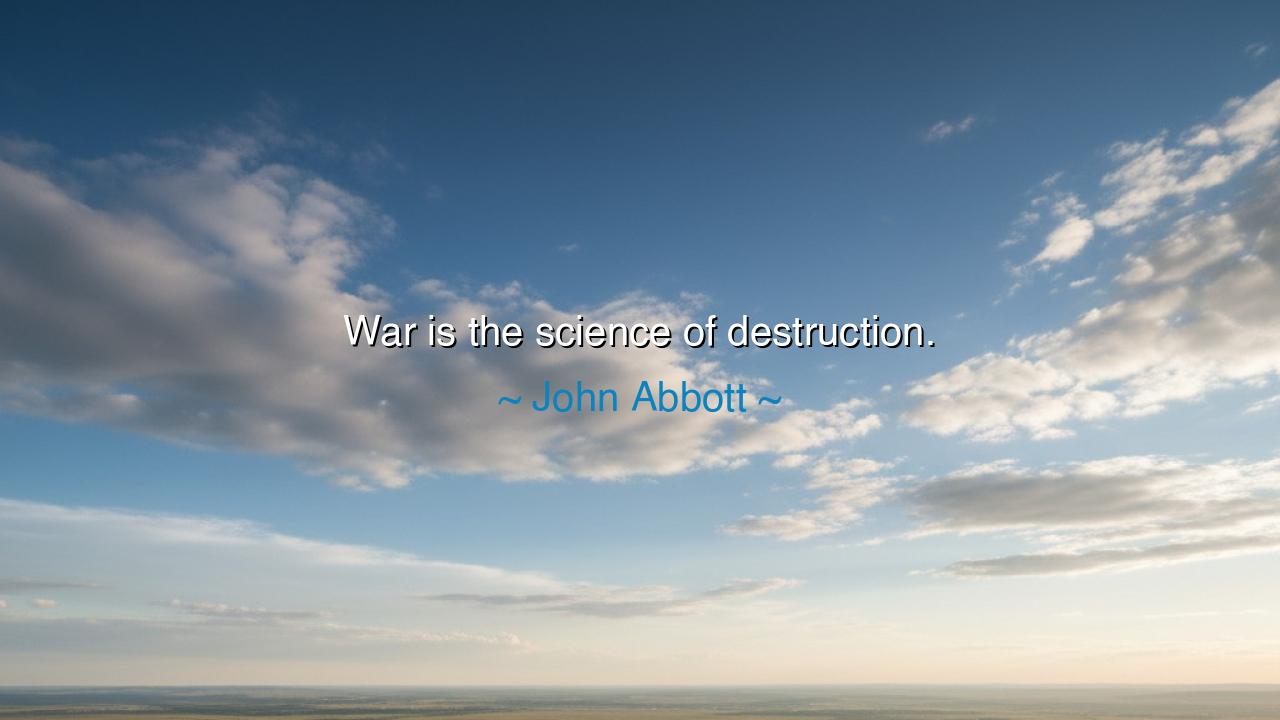
War is the science of destruction.






"War is the science of destruction." These words, spoken by John Abbott, resonate with the profound and tragic truth about the nature of war. In his statement, Abbott captures the essence of conflict—war is not just a chaotic clash of wills; it is a calculated, methodical force that is shaped by science and reason, but only to unleash the most destructive consequences. War, when viewed through the lens of science, is an art of destruction, where every strategy, every tactic, and every weapon is designed to break, to shatter, and to dismantle. This truth serves as a stark reminder that war is not simply a violent outburst of anger but a carefully planned operation, built on the foundation of calculation and devastation.
In ancient times, the great philosopher Thucydides chronicled the Peloponnesian War, a conflict that tore apart the very fabric of Greek society. He observed how ruthlessness and strategy intertwined, and how those involved in war understood it not only as a fight for survival but also as an art of systematic destruction. Even in his day, war was not just about fighting—it was a science. The soldiers, generals, and statesmen understood that their actions, whether through the art of siege warfare or the formation of battle strategies, were guided by principles that, though meant for victory, often resulted in the near annihilation of their enemies. This wisdom passed down through history, informing us that war, while seemingly chaotic, is fundamentally built upon the science of destruction.
Consider the example of Napoleon Bonaparte, one of history’s greatest military minds. His strategic genius was not just in his courage or his ability to inspire, but in his understanding of the science of war. Napoleon’s tactics, his methods of mobilization, his use of artillery, and his precision in executing battle plans were all grounded in a deep understanding of destruction. His campaigns reshaped entire continents, but the cost was staggering—countless lives lost, cities reduced to rubble, and entire civilizations plunged into despair. Napoleon’s brilliance in war, while advancing his empire, also laid bare the devastating consequences of warfare as a science: it was a calculated path of ruin, where every victory was marred by immense suffering.
In more recent times, the World Wars of the 20th century serve as the epitome of war as science. The development of nuclear weapons during World War II, such as the bombings of Hiroshima and Nagasaki, illuminated the terrifying power of science when applied to destruction. The atomic bomb was not simply a weapon of mass killing; it was the culmination of years of research, experimentation, and planning. The scientists who created it, driven by wartime necessity, were also acutely aware of the immense destructive power they were unleashing. The bombing not only changed the course of the war but also forever altered the landscape of global politics and warfare. It demonstrated the horrific reality that the more advanced the science, the more deadly the destruction could be.
However, the lesson of Abbott’s words is not just about recognizing the destructive nature of war, but understanding the responsibility that comes with it. The science of destruction is a two-edged sword—while it can bring victory, it also brings ruin. The great civilizations of history, from Rome to Britain, have learned that war, when conducted without restraint or purpose, leads only to decay and collapse. The great empires that once dominated the world often fell, not from the strength of their enemies, but from the internal destruction caused by their unrelenting wars. This is the paradox of war as a science—it may promise victory, but it also leads to the disintegration of what it is meant to protect.
The ultimate lesson from Abbott’s words is clear: war is not just a political or military struggle—it is the science of destruction that demands deep contemplation. It is a force that must be approached with great caution, for the more advanced our technologies become, the more destructive our wars will be. In our own time, as we stand on the precipice of further technological advancements, we must be vigilant. Peace, after all, is not merely the absence of war; it is the wisdom to recognize the destructive potential of our tools and the resolve to use them to create, not destroy. The science of destruction must be balanced by the science of peace, where we use our understanding to build a future that is not defined by warfare but by collaboration, understanding, and progress.
In our own lives, we must remember that the choices we make, whether in moments of personal conflict or on the larger stage of global affairs, will shape the world. We must strive to avoid the path of destruction, understanding that true power lies not in the ability to destroy, but in the ability to create and heal. Just as science can lead to the invention of machines of war, so too can it lead to the creation of technologies that promote health, unity, and understanding. The lesson of Abbott’s words calls us to wield the sword of science with wisdom—to use it not to harm, but to build a better world for generations to come.






AAdministratorAdministrator
Welcome, honored guests. Please leave a comment, we will respond soon